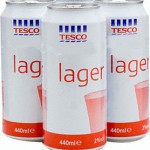This text is about Tesco rebranding its own cheap range of products. Useful language to do with retail business English is highlighted and explained below. If you are studying IELTS or CAE, cultural knowledge and vocabulary included here is invaluable - if you use it, it can help you get high marks! If you want a print-friendly version of this article, click here.
Tesco is the UK s most popular and affordable supermarket chain. Part of its success is because it has been offering customers cheap alternatives to famous brands for 20 years. Its low cost own-brand products are sold under the Tesco Value label which is known for being the nation s favourite. The rock bottom prices are generally far lower than regular brands, for instance a can of beans only retails at 3p. That represents a huge cost saving for most shoppers. Unfortunately for Tesco, their market has changed and for the first time in its history Tesco has just released a profit warning. This is the result of an unsuccessful low price promotional campaign and poor Christmas sales. During the first 3 months of 2012, Tesco s market share dropped significantly and the heads of the company realised something had to be done. In response, the decision has been made to say goodbye to the no frills Tesco Value range. It will be rebranded and replaced with a more modern and less cheap looking brand. The entire 550 product range will reappear under the Everyday Value range. The new label has a 1950 s look which is more attractive than the current basic blue striped one. It s not just the name that s changing though. Tesco is revamping a number of products and increasing the standard so cost-saving ingredients like MSG are being removed. Unlike the previous brand s emphasis on cost over quality, the latest brand seeks to offer good quality at an affordable price and hopes to attract average and upmarket shoppers alike. Tesco is not the first to follow this strategy, archrival Asda (part of the Walmart group) has already upgraded its own label range with some success. As they have been have been taking market share from Tesco along with Sainsbury s and Morrisons, it s not surprising that Tesco has decided to follow the pack. According to retail analysts this was a long time overdue , whilst others are saying that it s disappointing because Tesco are just copying the rest of the market. Even though Tesco still holds the biggest market share, its growth rate (2.7%) is less than impressive. Maybe this latest step will help them fend off their market challengers and reinforce their market leader position. Yet, it could also backfire and Tesco may lose their main customers. [poll id="36"]
Useful Language: Retail Business English
- Affordable
- It has a price that people are able to pay which is often low
- Alternatives
- Other similar products
- Own-brand
- A brand created by the company
- Rock bottom prices
- Extremely cheap
- Regular brands
- Normal brands such as famous ones
- Promotional campaign
- Lots of advertising to tell people about something
- Heads of the company
- The people in charge of the company
- To say goodbye to sthg
- To cancel and stop making/selling it
- No frills
- To extras which are not needed
- To be rebranded
- When the whole image is changed
- To reappear
- To go away and then come back
- Revamping
- Improving
- Cost-saving
- A way to stop money being wasted
- Emphasis on cost over quality
- Stressing a low cost is more important than quality
- Upmarket
- High class
- Archrival
- Main competitor
- Upgraded
- Improved
- Improved
- To copy the others
- Overdue
- It should have happened earlier
- The latest step
- The most recent action
- To fend off someone
- To defend yourself against an attacker
- To reinforce sthg
- To make sthg stronger
- To backfire
- To have the opposite effect such as a strategy designed to increase sales actually reduces them
Discussion Questions
- How do you think customers will respond to Tesco s decision?
- How successful do you think Tesco s new brand will be?
- What else could Tesco do to improve its position?


